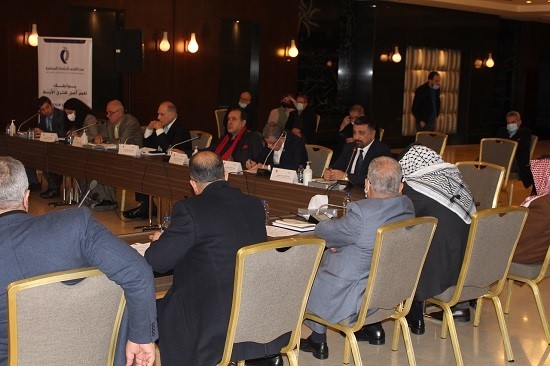AMMAN —
Al-Quds Center for Political Studies on Saturday held a conference titled “Arabs and Kurds: Dialogue is the way
to a common future”, the first of a series of events geared toward
strengthening social, political, and academic ties between the Arab and Kurdish
people of the region. It featured a diverse array of Kurdish and Arab panelists
across three sessions of discussion.
اضافة اعلان
Director of Al-Quds Center for
Political Studies Oraib Al-Rantawi said that while many conferences on the
topic have been held, “this dialogue has not been institutionalized”.
 Participants at the “Arabs and Kurds: Dialogue
is the way to a common future” conference which took place on Saturday, January
22, 2022. (Photo: Zane Wolfang/Jordan News)
Participants at the “Arabs and Kurds: Dialogue
is the way to a common future” conference which took place on Saturday, January
22, 2022. (Photo: Zane Wolfang/Jordan News)
The three sessions tackled “an
overview of the common history of Arabs and Kurds, and ideas for building on commonalities,
dispelling stereotypes and any mutual fears”, “the role of Kurdish and Arab
women in maintaining peace and stability, establishing rules for coexistence
and achieving justice for all”, and “a map of common interests and how to deal
with the Kurdish question: equal citizenship, a democratic nation, self-determination,
unified sovereignty and territorial integrity”.
Rantawi said Arabs and Kurds “were
founding nations of this region, thousands of years ago. Now, the Kurdish
question is a big issue in Syria, in Iraq, in Iran ... We have many Jordanians
and Palestinians of Kurdish origins, therefore, there is need to communicate
and establish a serious dialogue with each other in order to reach a better
understanding of our priorities, our interests, our fears, our concerns”.
The dialogue, he said, may help both
Arabs and Kurds to build a more stable and prosperous future based on common
interests and a common cultural ground.
“Without solving the Kurdish issue,
I do not think the Levant, at large — Syria, Iraq, Lebanon — will be stable,
prosperous or secure.”
Panelist Hanan Othman, head of
Nawroz Association, a social and cultural center for Kurds in Lebanon, member
of the
Lebanese Women Council, the Lebanese Committee for Defending Women’s
Rights, and a member of Kongreya Star, a women’s rights organization based in
northeast Syria, focused on the role of Arab and Kurdish women.
She told
Jordan News she
attended the conference because “I see this dialogue as essential — the
solution for the Kurdish people is through the Arab world; the Arab people, not
the authorities. The way forward is to have solidarity between the Kurdish and
the Arab peoples”.
As for the role of women, she referred
to a “revolution of women” led by Kurdish women in the autonomous region of northeast
Syria and cited a “unique experience” where Kurdish, Arab, Armenian, and Assyrian
women are involved at every level, including leadership, of the military,
politics, diplomacy, and all areas of society and culture.
She said that Arab women can look to
these Kurdish women to learn a lesson about independence and struggling for
equal rights, just as Kurdish women have learned from the experience of
Palestinian and other Arab women in the past.
Attending the dialogue was also Rafiq
Ghafoor, representing the Committee of the Kurdish-Arab Initiative.
Read more National news





